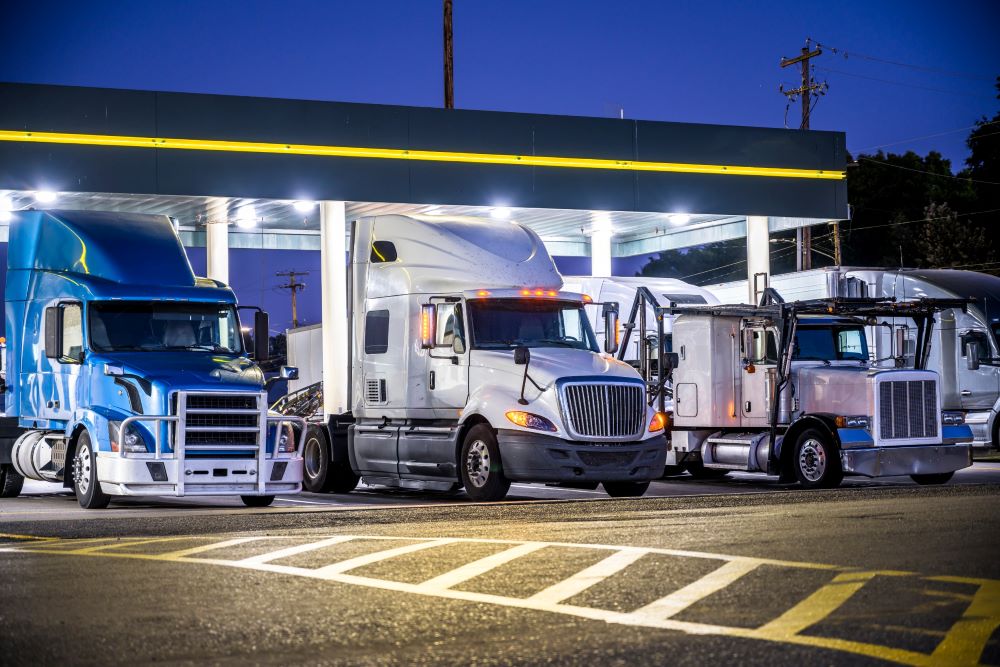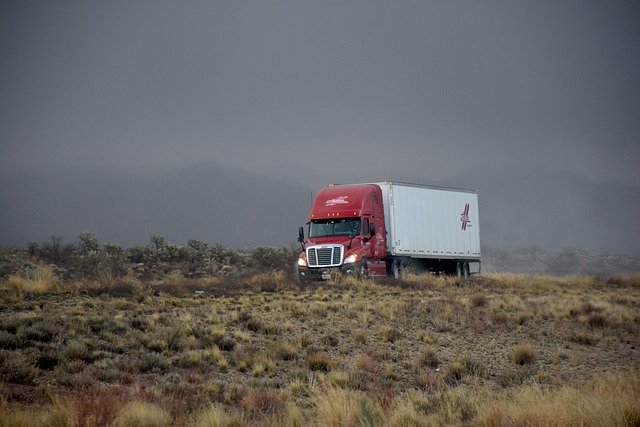
There’s a lot that could go wrong on the road as a commercial truck driver. So being properly prepared, and understanding all potential safety concerns, is so important.
Taking the right approach to truck driving safety will help you avoid accidents, and truck stop safety incidents, and keep your truck working properly. In this guide, we’ll break down all the different safety elements you need to be aware of as a truck driver.
Driving Safety Tips
It’s essential that truck drivers are always doing what they can to stay safe on the roads. As a truck driver, here are some of the most important truck driving safety tips to keep in mind.
Defensive Driving
Understanding defensive driving is essential for truck driver safety. This is when you maintain a proactive mindset by anticipating hazards and prioritizing safety on the roads.
Regularly assess your surroundings and other vehicles, predict and prevent potential risks, and adapt to changing conditions. Keep a safety cushion, use communication tools, and stay calm under pressure.
Maintain Proper Following Distance
Keep a safe following distance to allow for enough reaction time. Many truck drivers agree to maintain a minimum of one truck length for every 10 mph you’re traveling.

Use Mirrors Effectively
It’s essential for truck and bus drivers to check their mirrors regularly and to be aware of their surroundings. Adjust them properly before starting your journey and consistently monitor blind spots.
Anticipate Potential Hazards
Stay alert and anticipate potential hazards on the road. Look ahead for brake lights, traffic signs, and changes in traffic flow to respond proactively to any challenges. Of course, always wear your seat belt.
Practice Speed Management
Always stick to speed limits and adjust your speed based on road and weather. Avoid aggressive driving and maintain a speed that allows for safe stopping distances.
Avoid Distractions
Eliminate distractions inside the cab, such as mobile phones, and focus on the road. Distracted driving significantly increases the risk of accidents in the trucking industry.
Be Mindful of Blind Spots
Truck drivers deal with larger blind spots than smaller vehicles. Be aware of these blind spots and make necessary adjustments, such as signaling well in advance before changing lanes.
Participate in Ongoing Training
Stay up to date with industry best practices and regulations through continuous training. Ongoing education can enhance your defensive driving techniques and keep you informed about the latest safety technologies and truck driving tips.
Safety At Truck Stops
Truck drivers also need to stay safe when their commercial motor vehicles are parked at truck stops. Here are a few essential tips to keep in mind about this.

Choose Well-Lit Areas
Park in well-lit sections of the truck stop to enhance visibility and deter potential security threats.
Lock Your Vehicle
Always lock your truck when leaving, even if it’s just for a quick break. This may sound simple, but it’s essential to deter theft and unauthorized access.
Be Mindful of Personal Belongings
Keep valuable items out of sight and secure personal belongings to avoid attracting unwanted attention.
Stay Vigilant During Rest Breaks
When resting, stay aware of your surroundings. Be cautious of unfamiliar individuals and report any suspicious activity to authorities.
Use Designated Parking Areas
Park in designated truck parking areas to ensure you have enough space and avoid obstructing traffic flow.
Follow Truck Stop Rules
Always stick to any posted rules and regulations at truck stops. This includes speed limits, no-smoking zones, and other safety guidelines.
Fuel Up Wisely
Choose well-lit and reputable fuel stations. Be cautious when using your credit card and monitor for any suspicious activity at the fuel pump.
Truck Safety Checks
Beyond safety tips for driving or road conditions, keeping your truck well-maintained is vital for your safety. As a truck driver, here are a few necessary truck safety checks to keep in mind.
Vehicle Maintenance
Prioritize regular, comprehensive maintenance checks for your truck. This includes inspecting your brakes, tires, shocks, fuel filter, lights, fluids, starter, and any other critical components.
A well-maintained vehicle is fundamental for safe and efficient transportation.

Brake System Inspection
Regularly check and test your truck’s brake system, including brake pads, drums, and air pressure. Properly functioning brakes are essential for effective stopping and overall road safety.
Tire Care and Inspection
Inspect your tires for proper inflation, tread depth, and signs of wear. Ensure that all tires, including the spare, meet safety standards. Well-maintained tires enhance traction and reduce the risk of blowouts.
Lighting and Visibility
Regularly inspect all lights, including headlights, taillights, brake lights, and turn signals. Proper lighting is crucial for visibility, especially during low-light conditions. This is a major factor in road safety.
Fluid Levels Check
Monitor and maintain proper levels of essential fluids such as oil, transmission fluid, coolant, and windshield washer fluid. Adequate fluid levels keep your truck running smoothly and prevent mechanical issues.
Steering System Inspection
Ensure your steering system is functioning correctly by checking for any unusual noises, fluid leaks, or difficulty in turning. A responsive steering system is crucial for maintaining control on the road.
Suspension System Check
Inspect your suspension system for signs of wear, including worn-out bushings or uneven tire wear. A well-maintained suspension system is necessary for a smoother ride and better handling.
Safety Tips for Weather
Preparing for the weather is a major part of truck driver safety. Here are a few tips to help you with this.

Monitor Weather Forecasts
Stay informed about upcoming weather conditions along your route. Regularly check weather forecasts for potential challenges and plan accordingly.
Adjust Driving Speed
Reduce speed during adverse weather, such as rain, snow, or fog. Slowing down allows for better control, and increased reaction time, and minimizes the risk of accidents.
Increase Following Distance
Extend your following distance in dangerous weather. Wet or icy roads require more time and space to stop safely.
Avoid Cruise Control
Disable cruise control in slippery conditions. Maintaining direct control over acceleration and deceleration is crucial for safe driving in tricky weather.
Brake with Caution
Apply brakes gently to avoid skidding on wet or icy surfaces. Practice controlled braking to maintain stability.
Stay Informed About Road Conditions
Check for real-time road condition updates, especially in winter. Be aware of closures, detours, or areas prone to ice patches.
Secure Cargo in Windy Conditions
In windy conditions, ensure that cargo is properly secured to prevent shifting, which can affect the stability of the truck.
It’s a good idea to stay in contact with your dispatcher or fellow drivers to share information about weather and road challenges. Collaboration enhances overall safety.

Safety Tips For Women Truckers
Female truck drivers often face many unique safety challenges while on the road. Here are some essential safety tips to keep in mind.
Choose Well-Lit Rest Areas
When stopping for breaks or rest, opt for well-lit, busy areas. This enhances visibility, which can help with security.
Maintain Regular Communication
Stay connected with family, friends, or fellow truckers. Regular check-ins can provide a sense of security and allow for swift responses in case of emergencies.
Secure Restroom and Shower Facilities
Utilize truck stops or rest areas with secure and well-maintained restroom and shower facilities. Be aware of your surroundings and report any concerns.
Know Your Route
Familiarize yourself with the route and plan your stops in advance. This minimizes uncertainty and allows you to make more informed decisions about where to rest or refuel.
Carry Personal Safety Devices
Keep personal safety devices, such as a whistle, pepper spray, or a personal alarm, easily accessible. These tools can provide an added layer of protection in emergencies.
Invest in Self-Defense Training
Consider enrolling in self-defense classes to build confidence and learn techniques that can help you in emergency scenarios.
Establish Boundaries
Clearly communicate and assert personal boundaries with colleagues, fellow truckers, or anyone encountered during the journey. Trust your instincts and prioritize your comfort and well-being.

Secure Cab Access
Ensure that your truck’s cab is properly secured when parked, especially during rest stops. Lock your doors and windows to prevent unauthorized access.
Network with Other Women Truckers
Connect with other women truckers through industry groups or forums. Sharing experiences and advice fosters a supportive community and provides valuable insights into navigating the profession.
Report Security Concerns Promptly
If you encounter any suspicious activity or feel uneasy about a situation, report it straight away to authorities or your company’s security team.
Trust Your Intuition
Always trust your instincts. If something feels off or uncomfortable, take action to prioritize your safety, whether that means changing your route or seeking assistance.
Final Thoughts
Truck drivers can face all kinds of dangers on the roads. However, by being properly prepared for them and proactively focusing on your safety, you should be able to avoid these issues.
Make sure you take care of your vehicle, follow the right driving safety precautions, and understand how to stay safe in your surroundings. This will make your life as a truck driver far easier and more enjoyable.
Looking to purchase a new semi-truck? Then get in touch with us at Mission Financial Services, where we make gaining truck financing easy for everyone.


























